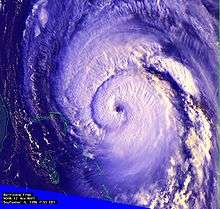High-resolution picture transmission

Weather satellite pictures are often broadcast as high-resolution picture transmissions (HRPTs), color high-resolution picture transmissions (CHRPTs) for Chinese weather satellite transmissions, or advanced high-resolution picture transmissions (AHRPTs) for EUMETSAT weather satellite transmissions. HRPT transmissions are available around the world and are available from both polar and geostationary weather satellites. The polar satellites rotate in orbits that allow each location on earth to be covered by the weather satellite twice per day while the geostationary satellites remain in one location at the equator taking weather images of the earth from that location over the equator. The sensor on weather satellites that picks up HRPT is referred to as an Advanced Very High Resolution Radiometer (AVHRR).[1]
Broadcast signal
The working frequency band for HRPT is L Band at 1.670–1.710 GHz and the modulation
types are BPSK and QPSK.[2] On NOAA KLM satellites the transmission power is 6.35 Watts, or 38.03 dBm.[3] The METOP-A satellite broadcasts with a bandwidth of 4.5 MHz.[4]
Reception
In order to receive HRPT transmissions a high gain antenna is required, such as a small satellite dish, a helical antenna, or a crossed yagi. Basic reception equipment includes a parabolic dish antenna attached to an Azimuth-Elevation unit. The HRPT signal is further enhanced with a 1.7 GHz pre-amplifier. An HRPT receiver unit and a dish tracking controller are required to steer the Azimuth-Elevation unit controlling the parabolic dish.[5] Free software such as the DWDSAT HRPT Viewer V1.1.0 is available to decode the transmissions.[6] The weather satellite transmissions are on 5 channels for HRPT or 10 channels for CHRPT.[7] The NOAA satellites have a resolution capability of 1.1 km.[8]
Satellite status
| Organization | Satellite Name | Orbit | Format | Frequency |
|---|---|---|---|---|
| NOAA | NOAA-15 | Polar | HRPT | 1702.5 MHz |
| NOAA | NOAA-18 | Polar | HRPT | 1707.0 MHz |
| NOAA | NOAA-19 | Polar | HRPT | 1698.0 MHz[9] |
| EUMETSAT | Metop-A[10] | Polar | AHRPT | 1701.3 MHz |
| CMA | Feng Yun FY-3A[11] | Sun-synchronous | CHRPT | 1704.5 MHz |
| CMA | Feng Yun FY-3B[12] | Sun-synchronous | CHRPT | 1704.5 MHz |
| CMA | Feng Yun FY-3C[13] | Sun-synchronous | CHRPT | 1701.3 MHz |
Notes and references
- ↑ http://noaasis.noaa.gov/NOAASIS/ml/avhrr.html
- ↑ http://www.scanex.ru/en/stations/default.asp?submenu=alice&id=specifications
- ↑ http://www.ncdc.noaa.gov/oa/pod-guide/ncdc/docs/klm/html/c4/sec4-1.htm
- ↑ http://www.eumetsat.int/idcplg?IdcService=GET_FILE&dDocName=PDF_ASPI_0674_EPS_CGS-US-SP&RevisionSelectionMethod=LatestReleased
- ↑ http://www.time-step.com/products_hrpt.htm
- ↑ http://www.satsignal.eu/software/dwd-hrpt.htm
- ↑ http://www.rig.org.uk/reception.htm
- ↑ http://www.space.cetin.net.cn/docs/ht0105/ht010502.htm
- ↑ http://noaasis.noaa.gov/NOAASIS/ml/status.html
- ↑ http://www.eumetsat.int/idcplg?IdcService=GET_FILE&dDocName=pdf_td18_metop
- ↑ http://www.wmo-sat.info/oscar/satellites/view/113
- ↑ http://www.wmo-sat.info/oscar/satellites/view/114
- ↑ http://www.wmo-sat.info/oscar/satellites/view/115